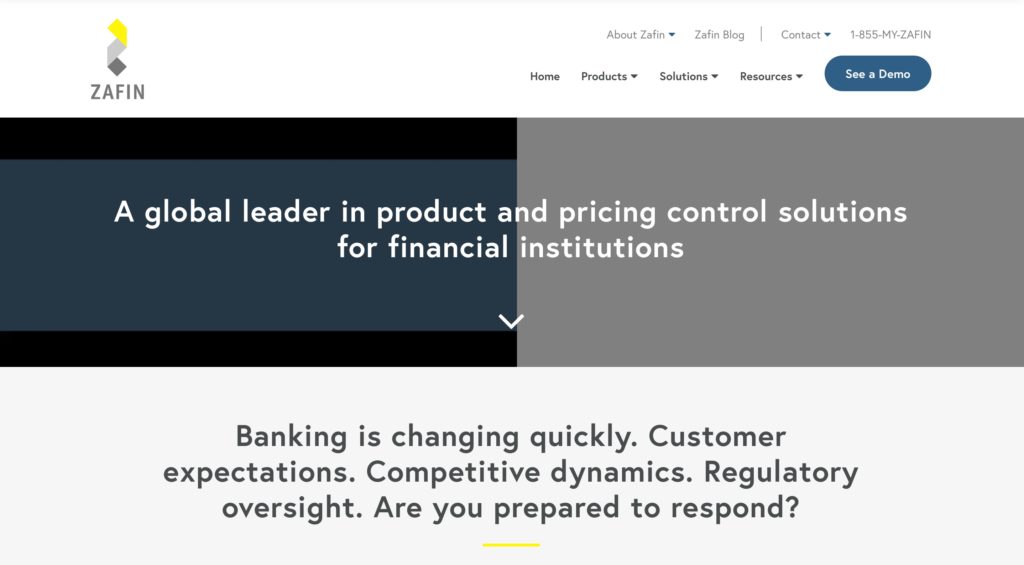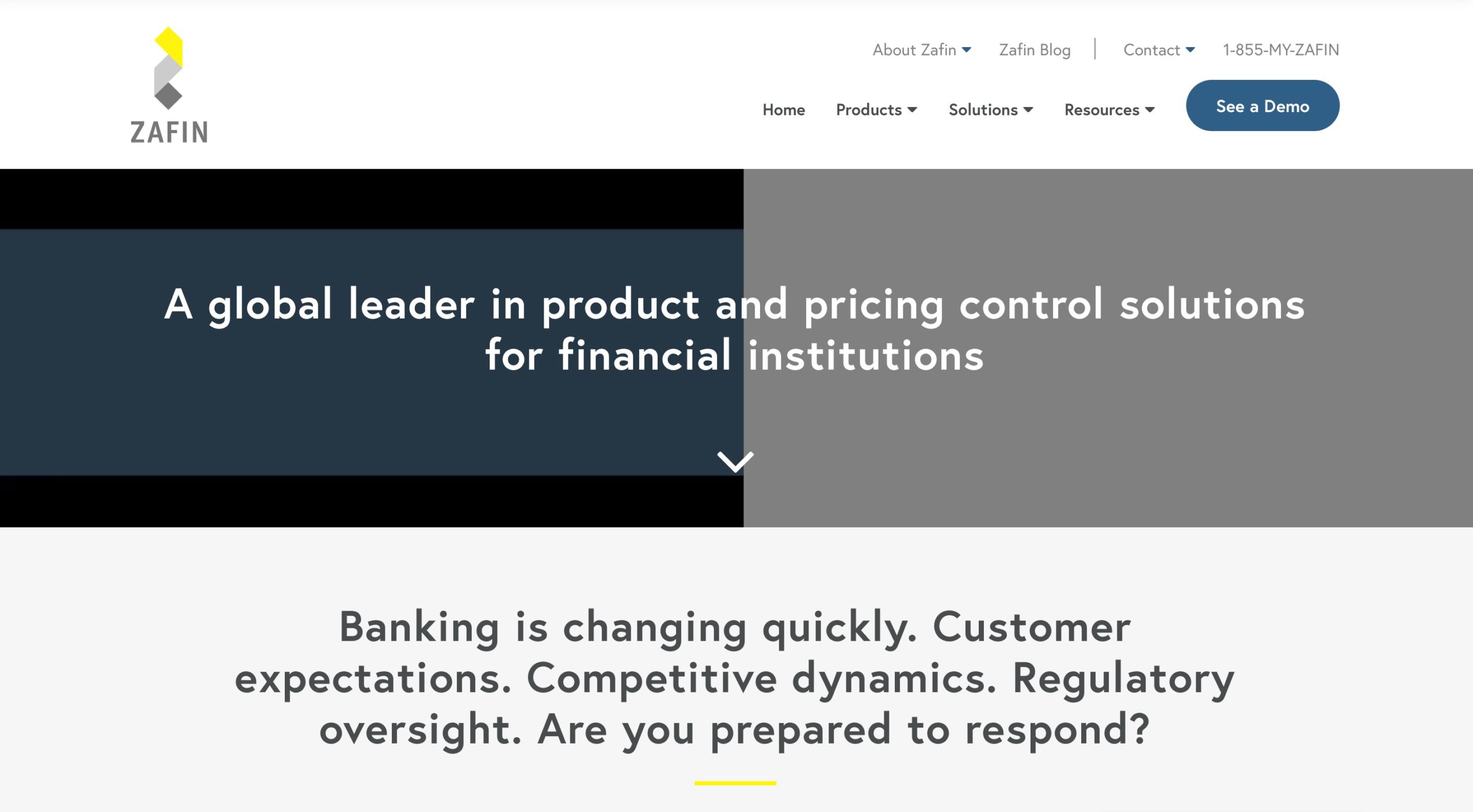A global product and pricing solution provider for banks, Zafin finished 2019 with a new Salesforce integration and began this year with a major change at the top: adding financial services veteran Venkataraman Balasubramanian (known informally as “Bala”) as the company’s new Chief Technology Officer.
Balasubramanian arrived at the Toronto, Ontario, Canada-based company at a time of major innovation in the financial services industry – as well as a time of significant disruption in the everyday lives of people all over the world due to the coronavirus pandemic. How is Zafin helping banks and other financial institutions cope with the current environment? How do some of the most compelling technology innovations of our time – from advanced machine learning and AI to the blockchain and Big Data – give innovators the tools they need to find new solutions to old – and new – problems? We talk with “Bala” about all this and more in our latest Finovate Alumni profile.
Finovate: You have only been at Zafin for a month or two. How are you finding your new position? Any surprises?
Venkataraman Balasubramanian: It has been an incredible first few months for me here at Zafin. First and foremost, I find myself in the midst of a very talented group of people: engineers, business and technical analysts, a robust management team, and a very dedicated client success team. The depth of these teams is a testament to the value our clients see in our products.
Counter-intuitive yet brilliant has been the approach our management team has taken during these very trying times: to continue to bring in strong talent that will put us in a strong position coming out of this period of economic uncertainty.
Zafin was among the first to move to protect our employees by requiring all to work remotely. Our employees have access to extra “care days” for this year as a benefit. Recognition that the safety and well-being of our team is paramount to our client success is unusual to see in a business our size and one we continue to focus on.
Finovate: You have more than 35 years of experience in financial services and information technology. What attracted you to Zafin?
Balasubramanian: Digital was here to stay even before our current crisis. It is now even more so cemented in our everyday lives. This aspect of digital, however, goes far beyond the creation of experiences into the digitization of entire workflows — propositions that resonate in this context with a cloud-first service architecture, enabled by artificial intelligence and machine learning.
The implementation of such a system typically requires truly digital fintech partners (such as Zafin) and services integration (SI) partners. Having spent considerable time with SI partners in my prior roles, I felt that the timing is appropriate to work with a specific digital enabler. Zafin provided that opportunity in that its solution truly enables a digital transformation of the customer experience across the entire customer relationship and banks’ business lines.
Finovate: What are some of the things you are most eager to accomplish in your first year as CTO?
Balasubramanian: We are a cloud-based solution today, and I would like for us to be a multi-cloud solution in a manner that is unique. We are currently defining that framework, and I hope to get it to completion during the year.
In the era of digital transformation, core systems transformation will progress considerably. To that end, I expect to work with both existing core providers and transformational core providers to enable a “Bank-in-a-Box,” with a modernized core and externalized cross-product layers that enable product, pricing, and billing functionalities. Further, we will look to incorporate AI/ML capabilities into our solution to create proactive end-user interfaces.

Finovate: What are some of the most significant changes in the banking industry going on right now and what role is Zafin playing to help banks and other financial institutions successfully navigate these changes?
Balasubramanian: COVID-19 has redefined life as we know it, and financial services are no exception. Whether it is social distancing, phased restarts of the economy, or just the uncertainty that this virus has created, it has made us all think about the experiences we want in our everyday lives. Naturally, this means digitizing many facets of those experiences.
We want payments to be contactless and frictionless. We want highly relevant products and offers that seek to simplify our lives. From a banking perspective, Zafin works with banks to digitize the product lifecycle and its applicability to pricing and billing by injecting the customer and relationship context. We also enable banks with a cross-product layer that allows the centralization of product variants across the various systems. These are fundamental building blocks as a bank strives to digitize customer journeys.
Finovate: There are a number of enabling technologies that are helping drive innovation in fintech right now: AI, Big Data, blockchain, machine learning, and so on. Which technologies do you believe are being leveraged most effectively in the industry and how?
Balasubramanian: Each of these enabling technologies is at various stages of maturity, depending on the use case. Blockchain has great applicability not merely as a decentralized ledger, but also in immutability. Yet, that set of applications has some adoption in capital markets and not quite yet in other facets of the industry. Community creation has been a major impediment to its success.
Big Data, AI and ML have a slightly more nuanced twist: These require a considerable upfront investment in terms of data and infrastructure, hypothesis creation, testing and validation to produce a result. This will likely only be valuable if it is integrated into the delivery system — otherwise, it may turn out to be nothing more than an interesting experiment.
As these technologies and usage mature, they will prove more valuable. The discontinuity that the current situation creates allows for value systems to be re-arranged, and, in so doing, I believe many more interesting use cases will be discovered.
Finovate: Tell us more about how the COVID-19 pandemic is impacting Zafin and the work it does? How is it impacting you and your work, having just arrived at the company?
Balasubramanian: If there was one major surprise for me that I didn’t answer in the very first question, it is this. We were among the first companies to transition our entire workforce to a remote setup. We rapidly implemented technologies to enhance internal collaboration and client communication. Working remotely may have impeded my own ability to get to know my team personally (as I would have typically done), but given the circumstances, our transition has been about as seamless as it could have been.
In some cases, COVID-19 has accelerated banks’ plans for digital transformation. Based on the volume and nature of conversations we’re having with banks and partners, if anything, the interest in and demand for what we offer has only increased over the past few months.
As much as we hope for the return to what we knew as “normal”, we are also certain that a new normal will emerge. And we think we are well prepared for that.

